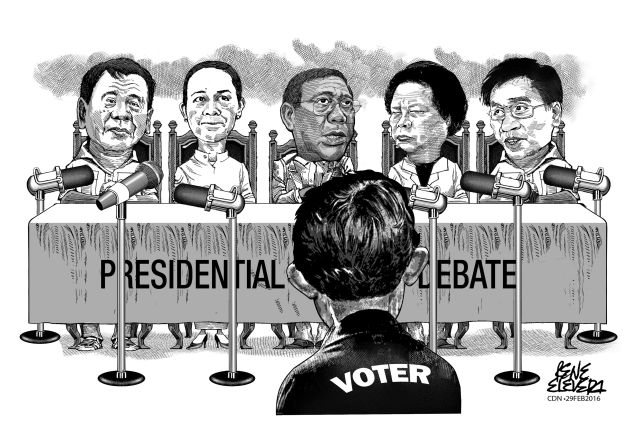
As had been reported in the media, the Sunday debate was patterned after the ongoing presidential debates in the US that were sponsored by an assortment of US networks.
There were shared observations that the time given to each candidate to make their answers were too short and they weren’t allowed to interact too much with each other.
But to be fair, the candidates were probably sizing each other up before making their carefully thought out and processed answers. In a televised setting that was sure to be watched by the country’s voters, each candidate can ill afford to drop a beat and step.
That said, there were certain elements that people had come to expect of the debate and their initial impressions were spot on. These include Davao City Mayor Rodrigo Duterte’s usual folksy answers to issues topped off with his avowed declaration to end criminality and corruption in three to six months and Vice President Jejomar Binay’s denials of the corruption cases leveled at him and his son, suspended Makati City mayor Junjun Binay.
Last we heard, the next debate to be held at the University of the Philippines-Cebu will adopt a new format though it has yet to be confirmed. If that’s the case then we can only hope it’s better and that it will allow the public to see the stuff these candidates are really made of.
That said, we also consider Sen. Aquilino Pimentel III’s proposal for the TV debates to be commercial-free in order to allow the public unfettered access to the candidates for the post.
If we can recall, the last presidential debate held in 1992 was a spare affair with the Commission on Elections (Comelec) practically demanding that the TV network sponsor the debate’s telecast at no cost to them, free of charge with no commercials whatsoever.
This was resented not only by TV networks but by media outlets who also have to shoulder the technical costs of staging the debate. The Feb. 21 televised debate didn’t come cheap and though the public would insist that it is part of public service, networks should not be denied the opportunity to at least cover the costs of their telecast.
Pimentel proposed that the Comelec hold a bidding for the rights to telecast the TV debates but would Congress, which fiddled with the Comelec’s budget for too long, be able to pass a budget for this activity?
Perhaps Pimentel’s proposal will be tackled by the next Congress. Until then, the public can not wait for the next scheduled debate of presidentiables.